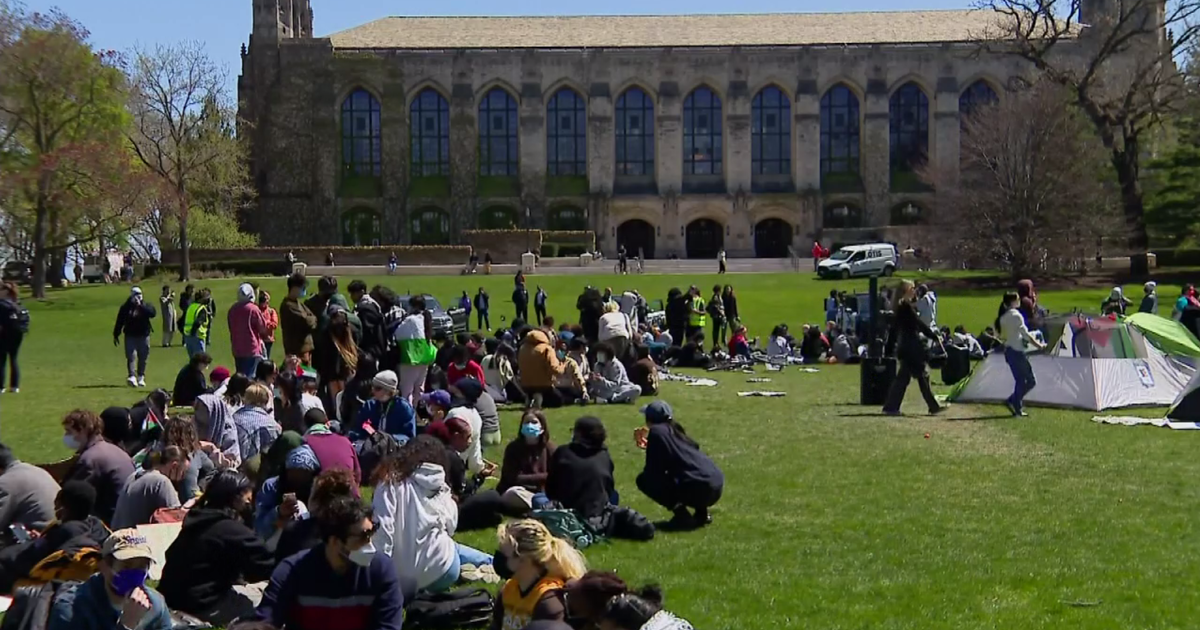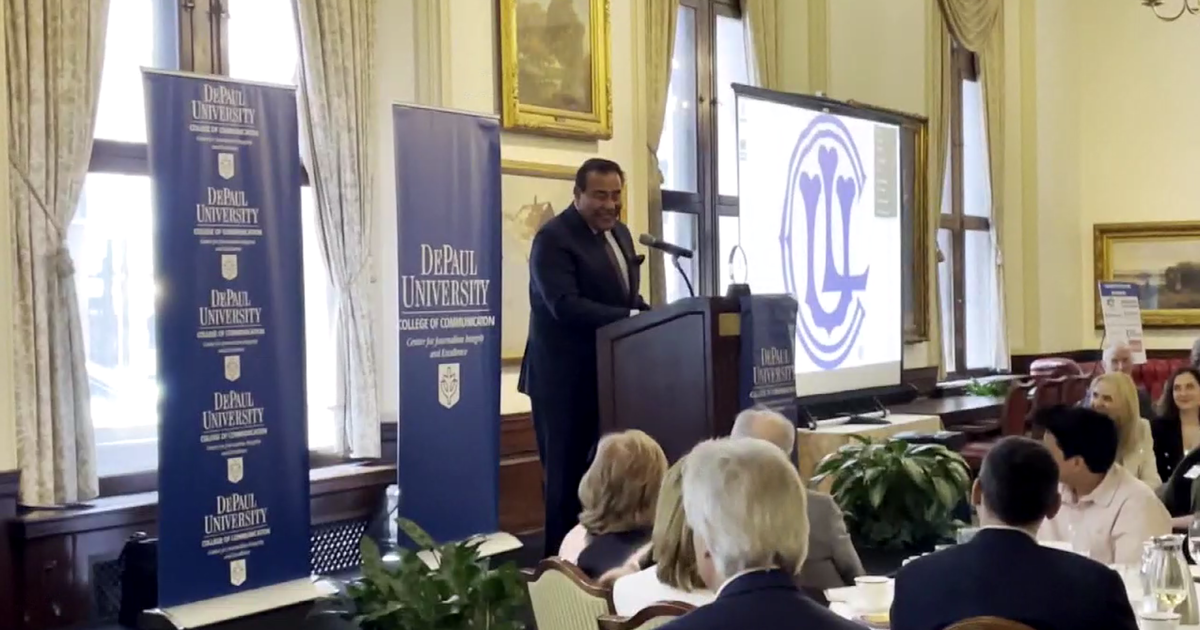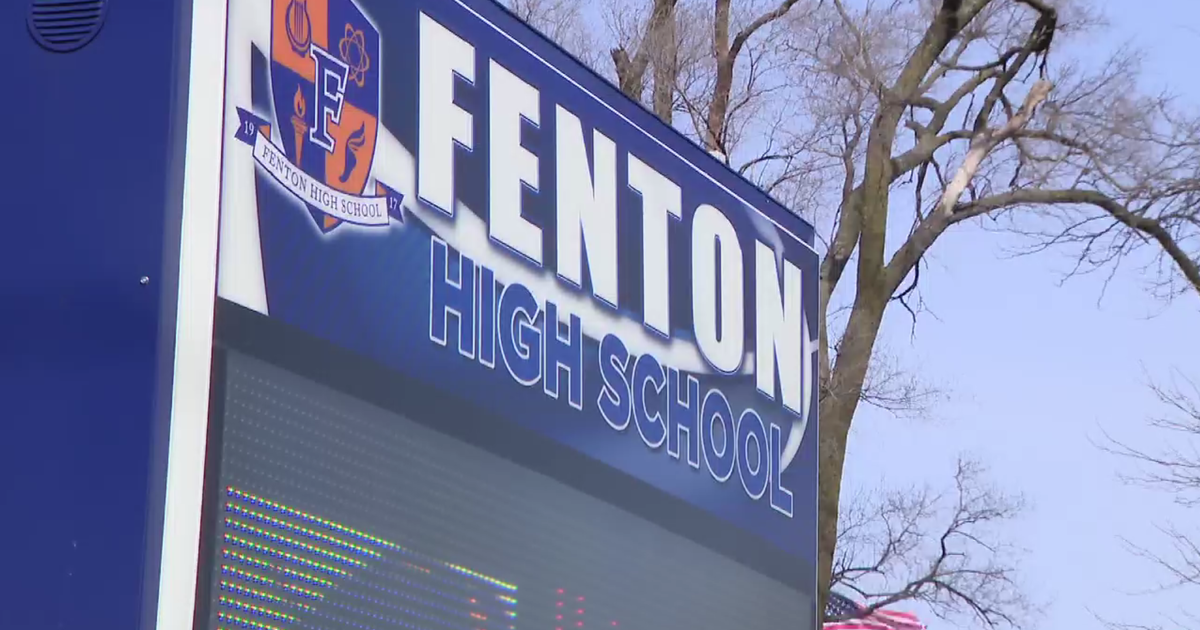Northwestern Journalism Professor Accused By Students Of Sex Harassment
CHICAGO (CBS) -- Ten women have accused a prominent Northwestern University journalism professor of sexual harassment and bullying.
In a letter to Medill School Of Journalism Dean Bradley Hamm, the women say Professor Alec Klein made sexually graphic remarks at work, gave unwanted neck massages and asked a female employee to come to his hotel room for drinks on a business trip.
Klein, an award winning journalist and director of the Medill Justice Project, denied the allegations. In a statement he said:
I categorically deny the allegations and intend to take legal action. Many of the allegations involved a disgruntled former employee who had been on a corrective-action plan for poor work performance several years ago. The university conducted an extensive investigation, interviewing current and former employees, former students and others, and reviewing emails, expenses and other records. The complaint was determined to be completely unfounded.
All the women say they experienced some form of harassment or bullying by Klein and some said they were sexually harassed.
"Today, we are writing to tell you that Alec Klein's time is up," the letter states. "His harassing behavior. His predatory behavior. His controlling, discriminatory, emotionally and verbally abusive behavior has to end."
Klein is also accused of asking an employee if she was a stripper and talked about his sex life and pressed for details about others' sexual activity.
Klein's behavior was not just about sex, the women said.
He berated students to the point of tears and required "unnecessary closed-door meetings during which he pressed several of us to divulge deeply personal details about our lives, only to later use this information against us as a tool of manipulation," the women say.
The letter was signed by: Alison Flowers, Meribah Knight, Kalyn Belsha, Olivia Pera, Suyeon Son, Lorraine Ma, Yana Kunichoff, Natalie Krebs, Lauryn Schroeder and Fariba Pajooh.
In a statement, Northwestern University spokesman Alan Cubbage said:
The University takes seriously all complaints that are brought to its attention. Many of the allegations were contained in a complaint brought several years ago by a former employee. At that time, the University conducted a thorough investigation and the complaint was not substantiated. Northwestern will now review the allegations received today.
Here is the text of letter:
Bradley J. Hamm
Office of the Dean
The Medill School of Journalism, Media, Integrated Marketing Communications
Northwestern University
cc: Jonathan Holloway
Office of the Provost
Northwestern University
Dear Dean Hamm:
This is Medill's #MeToo moment.
Today, we are writing to tell you that Alec Klein's time is up. His harassing behavior. His predatory behavior. His controlling, discriminatory, emotionally and verbally abusive behavior has to end. We all know about it. We've experienced it. It's time you heard us. It's time you listened.
Some of us date back to his first class at Medill almost a decade ago. Others of us worked under him as staff and fellows of the Medill Justice Project. His misconduct is now an open secret at Northwestern University to the point that many students have boycotted his class, robbing them of the opportunity to pursue investigative journalism at Medill.
Each one of us, the undersigned, has experienced harassment or bullying at the hands of Alec Klein.
And let's be clear: Some of us have also experienced sexual harassment and sexual misconduct.
• He attempted to kiss a prospective employee, prior to hiring her. On the same occasion, he asked if she smoked marijuana and asked to smoke with her and ordered her several cocktails.
• He asked a female employee to come to his hotel room "for drinks" on a business trip.
• He gave unwanted neck massages while a female employee was trying to work.
• He asked for a hug in return for giving an employee a requested day off.
• He made other unwarranted physical contact, such as grabbing a student's hand during conversations.
• He made sexually graphic remarks at work.
• He talked about his sex life and pressed for explicit details about others'.
• He frequently commented on employees' physical attractiveness, appearances, attire and bodies.
• He told female students they would be good fits for broadcast journalism because they were "good-looking."
• He asked if an employee was having another baby when she mentioned that her stomach hurt.
• He asked an employee if she was a stripper.
• He sent texts "intended for his wife" to a female student.
But many more experienced a different type of abuse. We were belittled, insulted and berated.
• He repeatedly accused students of insubordination and reprimanded them to the point of tears over minor or perceived offenses, such as pushing back on an editorial misjudgment or offering an alternative method to pursue an investigation, or agreeing with a peer's suggestion instead of what Alec Klein proposed. Several of us were summoned into his office individually, made to sit on a short cushion in a corner as he hurled accusatory vitriol about our mistakes and then refused to accept any apology. He sometimes retaliated by lowering students' final term grades even though these disagreements had nothing to do with academic performance.
• He continued to show retaliatory behavior after discovering that students went to senior staff at Medill to voice their concerns about him.
• He often required excessive and unnecessary closed-door meetings during which he pressed several of us to divulge deeply personal details about our lives, only to later use this information against us as a tool of manipulation.
• He retaliated against an employee by giving her a poor performance review after she defended herself against his verbal abuse.
• He has said: "You aren't as smart as you think you are."
• He has said: "You will never be a journalist."
• He told one of us, after learning her mother is a professional writer: "Your mother is a writer, I'd expect you to be a better writer."
• He questioned whether an employee had actually attended her grandfather's funeral after she had requested and taken the day off.
• He told one of us she needed an A- to earn his recommendation. He later promised a male student in the same class a recommendation in exchange for a B+.
• He scolded employees for "taking too much credit" for their work and in one instance denied any credit until proof was provided.
• He has yelled at employees and students and accused them of "ignoring him" for not immediately answering his phone calls or emails — at times, outside of working hours, or when one employee was on vacation, despite her returning his call within a few minutes.
• He has hung up the phone on several people who have challenged or called out his behavior.
• He was openly dismissive in class to a student who struggled with English and made it apparent that he did not like her Middle Eastern accent. According to this student, he "killed" her confidence and made her feel like "nothing," and he screamed at and hung up on her friend whom she had put on the phone with him for help.
• He has said about and to female students that they are "too emotional" and "immature."
Testimony of Alec Klein's awful behavior continues to spread through a whisper network of female students and alumni at Medill. Some of us, years later, can't shake the hurtful and demeaning things he said to us. Some of us have had to seek counseling and therapy in the aftermath of his behavior. This has to stop.
We are writing this letter because despite numerous allegations, investigations and complaints — and at least one settlement — Alec Klein is still teaching. He still has tenure. He is still leading the Medill Justice Project, a crown jewel of the institution. Many of us have spoken to Title IX officers. We've spoken to other university officials and still, nothing happens.
We are not seeking to merely reprimand Alec Klein. We are demanding accountability for his dangerous behavior. He is a liability and a predator among your faculty. Yet his actions have gone unchecked for years, further traumatizing more and more women. Medill has not only let us down — it has also failed to protect us.
This #MeToo reckoning joins a host of other women who are collectively unmasking powerful men across the globe. We have seen many men of great talent — even some of our journalism heroes — fall. But know this: Alec Klein is no hero. And journalism, especially the emerging journalists who come to Medill to learn in a safe space, will be better served without him.
We know many unheard voices remain. Medill alumni, colleagues, students and others may send their stories here: medillmetoo@gmail.com.
Respectfully,
Alison Flowers, MSJ 2009, Medill Justice Project 2011-2013
Meribah Knight, MSJ 2009
Kalyn Belsha, MSJ 2009
Olivia Pera, Medill Justice Project 2014-2015
Suyeon Son, Medill Justice Project 2012-2013
Lorraine Ma, BSJ 2013, Medill Justice Project 2011
Yana Kunichoff, MSJ 2009
Natalie Krebs, BSJ 2013, Medill Justice Project 2011
Lauryn Schroeder, MSJ 2013, Medill Justice Project 2013-2014
Fariba Pajooh, MSL2016, Medill Justice Project 2016-2017
Here is the full text of Klein's response:
Alec Klein statement
I categorically deny the allegations and intend to take legal action. Many of the allegations involved a disgruntled former employee who had been on a corrective-action plan for poor work performance several years ago. The university conducted an extensive investigation, interviewing current and former employees, former students and others, and reviewing emails, expenses and other records. The complaint was determined to be completely unfounded. I was cleared of any wrongdoing and the claim was dismissed. The university determined the complainant was not credible and documented, through records and her own words, several falsehoods in her charges. The university took the additional step to require that she never apply for a job at Northwestern again. And the university reached out to every person interviewed as part of its investigation to notify them that I had not done anything wrong and the case had been dismissed.
The bulk of the other allegations were brought to the attention of Northwestern's Office of Equal Opportunity and Access, and no violations were found.
Under separate cover, I have provided you with the Course and Teacher Evaluation of Medill Justice Project classes I have taught at Northwestern University over the nearly decade I have been a professor at the university. The student evaluations are anonymous, which means students are free to say whatever they like. Instructors do not see these anonymous evaluations until after the grading period is over. In their anonymous evaluations, my students have overwhelmingly indicated they had a wonderful experience in my classes, and not once have they accused me of any mistreatment. In their anonymous evaluations, my students have overwhelmingly said the class was among the best they have ever taken, and they have specifically noted how much I care for them.
I have taught hundreds students in scores of classes at Northwestern. I have also served as an adviser to scores of students and overseen scores more who have worked with me. I strive for all of the students in my classes to have a wonderful experience. It's also true that I have high expectations for my students and expect them to do their best because the goal is for them to become better journalists. Investigating potentially wrongful convictions is rigorous work, and it requires the highest levels of accuracy, fairness and thoroughness because we are publishing for the world. Our work sometimes challenges powerful institutions and is always closely scrutinized. I am fully committed to my students and spend countless hours working with them, helping them conduct reporting in the field and editing their work. For years, my Medill Justice Project class was open only to undergraduate Medill students who must apply to be admitted, and there is frequently a long wait list. Because of growing demand, in 2013, I opened the course to graduate students and to non-Medill students at Northwestern University. In 2014, I won approval from the full Medill faculty to turn the class into the equivalent of two courses instead of one to better reflect the students' significant time commitment.
Over the years, I have received countless letters and emails from students expressing their gratitude for their experience in my classes, and have also been honored at various faculty appreciation events and received recognition for my teaching at Northwestern.
Because of federal laws about student privacy, I am limited in what I am permitted to say about the former students referenced.
I have tried to lead The Medill Justice Project with honor. Our investigation played a role in a federal judge's decision to release a day care worker about a decade before her sentence would have been up. In another investigation, prosecutors dropped all major charges against a stay-at-home mother who was then set free. Our work contributed to a prisoner being released from solitary confinement after more than 36 years. There are many other instances where our work has helped people and society.
Respectfully,
Prof. Alec Klein, Northwestern University
Director, The Medill Justice Project



